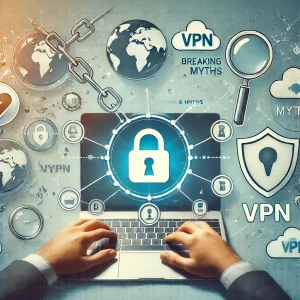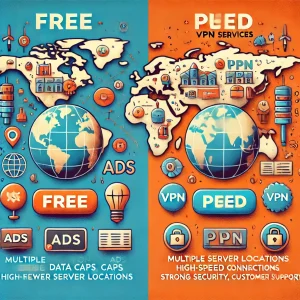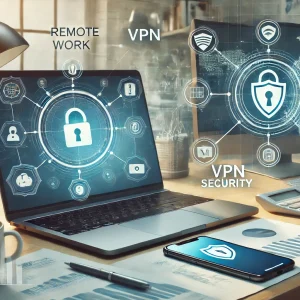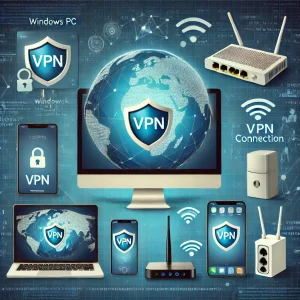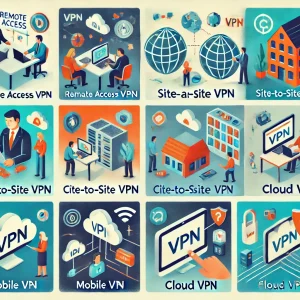
In an era where privacy and security are paramount, Virtual Private Networks (VPNs) have become indispensable tools for both individuals and businesses. VPNs provide secure connections over the internet, ensuring that your data remains private and protected from potential threats. However, not all VPNs are created equal. In this comprehensive guide, we will explore understanding the different types of VPNs and their uses, explained in 2024.
What is a VPN?
Understanding the different types of VPNs starts with grasping what a VPN, or Virtual Private Network, is. A VPN creates a secure, encrypted connection over a less secure network, such as the internet. VPNs protect private web traffic from snooping, interference, and censorship. People use them widely in various contexts, including personal privacy, corporate security, and bypassing geo-restrictions.
Types of VPNs and Their Uses Explained in 2024
Remote Access VPN
Overview:
Remote Access VPNs allow individual users to connect to a private network from a remote location. Telecommuters and mobile workers commonly use this type of VPN to access their company’s internal network securely.
Uses:
- Telecommuting: Employees working from home can securely access company resources.
- Secure Browsing: Individuals can protect their internet traffic on public Wi-Fi networks.
- Remote File Access: Users can access files stored on a network server from anywhere.
Site-to-Site VPN
Overview:
Site-to-Site VPNs, also known as Router-to-Router VPNs, connect entire networks to each other. Large organizations with multiple offices in different locations commonly use this type.
Uses:
- Corporate Networks: Connects different office locations to share resources and data securely.
- Intranet Connectivity: Ensures secure communication between internal networks.
- Cost Savings: Reduces the need for expensive leased lines.
Client-to-Site VPN
Overview:
Also known as End-User VPNs, Client-to-Site VPNs allow individual devices to connect to a corporate network. Unlike Remote Access VPNs, this type involves a client application installed on the user’s device.
Uses:
- Enterprise Access: Provides secure access to company resources for employees working remotely.
- Enhanced Security: Protects data transmission from individual devices to the corporate network.
- User Authentication: Ensures only authorized users can access the network.
Peer-to-Peer (P2P) VPN
Overview:
P2P VPNs optimize peer-to-peer file sharing. They provide anonymity and security for users who engage in P2P activities.
Uses:
- File Sharing: Facilitates secure and anonymous sharing of files between users.
- Privacy Protection: Masks IP addresses to protect user identities during file transfers.
- Bypassing ISP Throttling: Prevents ISPs from slowing down P2P traffic.
Mobile VPN
Overview:
Mobile VPNs maintain a secure connection for mobile users as they move between different networks, such as cellular and Wi-Fi.
Uses:
- Mobile Workforce: Ensures continuous secure access for employees who are frequently on the move.
- Public Wi-Fi Security: Protects mobile users when connecting to public Wi-Fi hotspots.
- Device Compatibility: Optimized for smartphones and tablets.
Cloud VPN
Overview:
Cloud VPNs provide secure access to cloud-based resources and services. Businesses that rely heavily on cloud infrastructure find them particularly useful.
Uses:
- Cloud Service Access: Securely connects users to cloud applications and services.
- Scalability: Easily scales to accommodate the growing number of users and devices.
- Cost Efficiency: Reduces the need for physical infrastructure.
Fixed VPN
Overview:
Fixed VPNs provide a secure connection to a specific location, typically used to access content that is geographically restricted.
Uses:
- Geo-Restriction Bypass: Allows users to access content and services available in a specific location.
- Consistent IP Address: Provides a stable IP address for accessing services that require a fixed location.
- Privacy: Protects user identity by masking the actual IP address.
Choosing the Right VPN in 2024
Understanding the different types of VPNs is crucial when selecting the right solution for your needs. Here are some factors to keep in mind:
Security Features
Look for VPNs with strong encryption standards, such as AES-256. Ensure the VPN offers robust protocols like OpenVPN, IKEv2/IPsec, or WireGuard. Check for additional security features like a kill switch, DNS leak protection, and multi-factor authentication.
Privacy Policies
Choose a VPN with a strict no-logs policy to ensure your data is not stored or shared. Consider the jurisdiction of the VPN provider, as some countries have mandatory data retention laws.
Performance
Evaluate the VPN’s speed and reliability, especially if you plan to use it for streaming or gaming. Check for server availability and distribution to ensure you can access the desired locations.
Compatibility
Ensure the VPN supports all your devices, including desktops, laptops, smartphones, and tablets. Look for user-friendly applications and easy setup processes.
Customer Support
Opt for VPN providers that offer 24/7 customer support and comprehensive troubleshooting resources.
The Future of VPNs
Understanding the different types of VPNs is also about anticipating future trends and developments. As we move further into 2024, VPNs are expected to evolve with advancements in technology and changes in user needs. Here are some trends to watch for:
Integration with 5G
VPNs will increasingly integrate with 5G networks to provide faster and more reliable connections, especially for mobile users.
AI and Machine Learning
AI-driven VPNs will enhance security by detecting and mitigating threats in real time. Machine learning algorithms will optimize server selection and connection speeds.
Quantum-Resistant Encryption
With the advent of quantum computing, VPNs will adopt quantum-resistant encryption methods to ensure long-term data security.
Decentralized VPNs
Decentralized VPNs (dVPNs) will gain popularity, offering enhanced privacy and resistance to censorship by distributing network control across multiple nodes.
Conclusion
Understanding the different types of VPNs and their uses is crucial for selecting the right solution for your needs in 2024. Whether you are an individual seeking privacy and security, a business looking to protect its network, or a mobile user needing secure access on the go, there is a VPN tailored for you. As technology continues to advance, VPNs will evolve to meet the growing demands for privacy, security, and performance in our increasingly connected world.
